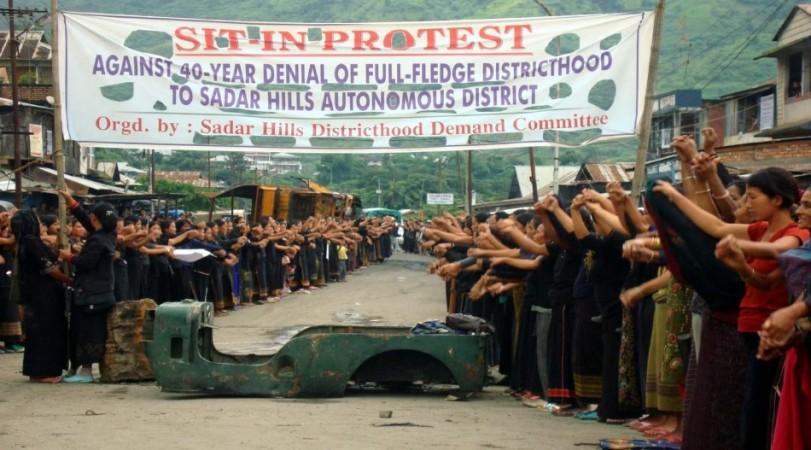
The ongoing economic blockades in Manipur have turned the hilly state into a warzone and resulted in a near-famine like situation for its residents. The blockade enters its 91st day today and the people of the state have had a miserable time.
The blockade is centered on the issue of creating a new Sadar Hills district for the Kuki tribe; a demand that the United Naga Committee (UNC) opposes, according to a report by IBNLive. The stand-off resulted in the blocking of National Highways 39 and 53, by both the Sadar Hills Districthood Demand Committee (SHDDC) and the UNC. The economic impact is the skyrocketing of prices of essential commodities, since the two National Highways are the primary road routes for importing goods from neighboring states.
"The problem in Manipur is a multi-faceted one. Taking advantage of the ongoing economic blockade, the activities of insurgency groups are increasing. If the blockade continues for a longer period it would have an effect on the human rights of the people of Manipur," said Onil Kshetrimayum, a long-time human rights activist, who works with the Just Peace Foundation and travels between Manipur and Delhi, in an exclusive talk with IBTimes. Kshetrimayum added that he felt the government was "not responding to the current situation"" and demanded immediate action to bring a conclusion to the problems.
"We have sent three memorandums since the inception of the blockade to Prime Minister Manmohan Singh, to look in to the present situation in Manipur. However, we have yet to get any response from him," said Premjit Singh, the state's Bharatiya Janta Yuva Morcha's (the youth wing of the Bharatiya Janata Party) Secretary-General, to IBTimes. Singh further added that if the state government was not functioning correctly, it should be the responsibility of the central government to deal with challenges.
As of now, even with protection from state police personnel, the number of vehicles carrying essential commodities is meager, as owners of the trucks are afraid of a backlash from agitators. A dozen vehicles, approximately, have been torched by protestors since the blockades began.
"Around 490 policemen 70 each from 7 battalions of Manipur police are deployed on daily basis on the NH 53 alone to protect the passage of trucks to Manipur, but as the intensity of the blockade continues agitators had torched a dozens of goods carrying trucks," said a Jamandar of the 1st Bn. Manipur Rifles (the oldest battalion of the state's police forces), Laimujam Satish Singh.
According to reports from various local people in the capital city of Imphal, petrol is being sold at prices between Rs.120 and Rs.140 per liter, while diesel sells at Rs.70 per liter. A LPG cylinder on the black market can cost between Rs.2,000 and Rs.2,500 and prices are higher still in other places, with people dependent on goods from the capital. According to another source, it is believed that the stock of petrol in Manipur will probably be depleted in three days. In fact, only a third of available stock is sold to the public, with VIPs and state departments confiscating the rest.
Prices of Essential Commodities in Manipur:
|
Commodity |
Price (Rs. per kg) |
|
Rice (parmal / super) |
25 /15 |
|
Sugar |
40 |
|
Onion |
40 |
|
Garlic |
80 |
|
Potato |
25 |
|
Edible oil |
1,200 per can of 15 liters |
|
Flour |
22 |
|
Maida |
24 |
|
Besan |
45 |
|
Peanuts |
37 |
|
Tomato |
40 |
These prices were supplied by residents of Imphal, on Oct. 30, 2011.

















